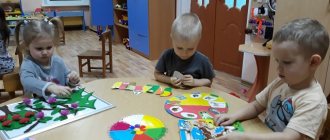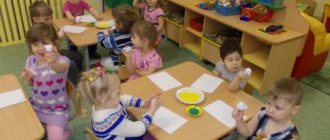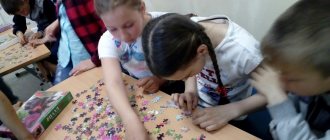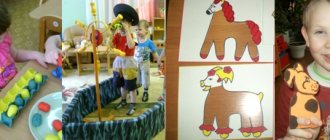Labor education of young children
Vera Gavrilova
Labor education of young children
The purpose of labor education: the formation of a positive attitude towards work.
Types of work:
•self-service;
•socially – useful work.
In younger groups, children’s work is organized in the form of individual assignments, which they carry out together with the teacher. Children need constant supervision. Due to their characteristics, children are not sufficiently independent in their actions, are prone to imitation, cannot yet coordinate their actions with the actions of their comrades, are often distracted, and do not finish what they start. Kids are little interested in the result; they are attracted by the process of action itself. They do not yet have the necessary skills and abilities to achieve results.
Therefore, the kids work together with the teacher: they help set the table, lay out materials for classes, water the plants, and collect vegetables in the garden. The adult takes on the most difficult work, leaving for the child what he can do. In the process of work, the teacher helps the child master the necessary skills, cope with emerging difficulties, and correct mistakes.
Tasks and content of self-service work:
1. Form the habit (first under the supervision of an adult, and then independently) of washing your hands when dirty and before eating, wiping your face and hands dry with a personal towel.
2. Learn to put yourself in order with the help of an adult.
3. Learn to use individual objects (handkerchief, napkin, towel, comb, pot).
4. Develop the ability to hold a spoon correctly while eating.
5. Teach children to dress and undress in a certain order; with a little help from an adult, remove clothes and shoes (unfasten front buttons, Velcro fasteners); Carefully fold removed clothes in a certain order. Accustom to neatness.
Socially useful work: tasks and content of work:
1. Involve children in performing simple labor actions: together with an adult and under his control, arrange bread bins (without bread, napkin holders, lay out spoons, etc.
2. To teach how to maintain order in the playroom and, at the end of the games, to place the play material in its place.
3. Encourage children's interest in adult activities. Pay attention to what an adult does and how, why he performs certain actions.
4. Learn to recognize and name some labor actions.
Term Contents of work
September
Week 1 - self-service - Game “We came to wash ourselves”
Week 2 – economic and household work – Conversation “Everything has its place”
Week 3 - work in nature - Involve children in filling water containers for settling water
Week 4 - joint work with adults - Involve children in helping the nanny (remove napkin holders and bread bins)
October
Week 1 – self-care – Exercise “Roll up our sleeves”
Week 2 – household chores – Game “Put the trash in the basket”
Week 3 – work in nature – Watering indoor plants
Week 4 – joint work with adults – Involving children in helping the teacher (preparation for the lesson); Involving children in helping the teacher (cleaning up fallen leaves on the site)
November
Week 1 – self-care – Exercise “Turn out your tights”
Week 2 – household chores – Exercise “Arranging the chairs”
Week 3 – work in nature – Spraying plants with water
Week 4 – joint work with adults - Targeted visit to the head nurse’s office, observation of the work of the head nurse; Involving children in helping the teacher (cleaning up fallen leaves on the site)
December
Week 1 - Self-Care - Button Up Exercise
Week 2 – household chores – Exercise “Lay out the pencils”
Week 3 – labor in nature – Wash the ficus leaves
Week 4 - joint work with adults - Help the nanny hang towels in the washroom; Involving children in helping the teacher (clearing snow on the site)
January
Week 2 – self-care – Exercise “We do everything in order”
Week 3 – household chores – Wipe off dust from toy shelves
Week 4 - joint work with adults - Helping the nanny set the tables for dinner (napkin holders and bread bins); Involving children in helping the teacher (clearing snow on the site)
February
1 week - self-service - Game "Odezhkin's House"
Week 2 – household chores – Wipe down toys
Week 3 – work in nature – Loosening indoor plants
Week 4 - joint work with adults - Help the teacher in washing doll clothes; Involving children in helping the teacher (clearing snow on the site)
March
Week 1 – self-care – Exercise “Let’s wash our hands”
Week 2 – household chores – Laying out books in the book corner
Week 3 – labor in nature – Planting large vegetable seeds
Week 4 - joint work with adults - Help the teacher in repairing books and educational games; Targeted visit to the canteen, observing the work of the cook
April
Week 1 – self-care – Exercise “Our things go to bed”
Week 2 – household chores – Remove building material after playing
Week 3 – work in nature – Watering indoor plants
Week 4 – joint work with adults – Helping the teacher prepare equipment for the lesson; Targeted visit to a laundress, observation of the work of a laundry worker
May
Week 1 – Self-Care – “We’ll Tuck Our T-Shirts” Game
Week 2 – household chores – Dress up the dolls in the doll corner
Week 3 – labor in nature – Wash plant leaves
Week 4 - joint work with adults - Helping the teacher in putting order in the play corners; Monitoring the work of the janitor.
Fostering work activity in children of primary preschool age is one of the most important results of work in kindergarten. It is at this age that the foundation for the formation of moral and labor qualities is laid.
Knowing the peculiarities of the organization of work, mastering methods and techniques with children of primary preschool age, students actively develop such personality qualities as hard work, humanity, respect for the work of peers and adults, and the results of their work. In addition, they develop a sense of friendship, responsiveness, independence, initiative, consciousness, etc.
Labor education of preschool children
Labor education of children in kindergarten
Article on the topic: “Labor education of preschool children”
Education should develop in a person the habit and love of work;
it should give him the opportunity to find work for himself in life. K. D. Ushinsky Education is one of the most important components of the educational process.
In accordance with the Federal Law of the Russian Federation “On Education”, education is considered as a purposeful activity aimed at creating conditions for the formation of a spiritual and moral personality, the integration of the individual into national and world culture, the formation of a person and a citizen integrated into his contemporary society and aimed at improving of this society (clause 2, article 14 of the Law of the Russian Federation “On Education”). In the Federal State Educational Standard for Preschool Education, one of the directions in social and communicative development is the formation of positive attitudes towards various types of work and creativity; formation of the foundations of safe behavior in everyday life, society, and nature (Federal State Educational Standard 2.6). For preschool children (3 years - 8 years) - a number of activities are implemented in self-service and basic household work (indoors and outdoors), construction from various materials, including construction sets, modules, paper, natural and other materials. (Federal State Educational Standard 2.7) V. A. Sukhomlinsky deeply believed in the ennobling power of labor: “If a child has invested a piece of his soul in the work of people and found personal joy in this work, he will no longer be able to become an evil, unkind person.” Emphasizing the role of education, K. D. Ushinsky wrote: “The opportunity to work and love for it is the best inheritance that both the poor and the rich can leave to their children.” So what is labor? Work should be considered as a means of mental education of children, since it contributes to the development of thinking, attention, intelligence, creative imagination, and the ability to plan one’s work. Labor education should be part of a child’s life from a very early age and carried out consistently and systematically. The program “From birth to school” distinguishes the following types of work: 1. Self-service
(work aimed at meeting everyday personal needs: dressing and undressing independently in a certain sequence; K-G skills; preparing and cleaning the workplace; 5 – 7 years – wash your small things, make your bed).
Work on developing self-care skills in each age group is structured differently. In the second junior group, it is carried out frequently - once a week, and as children acquire skills, the volume of planned work decreases in the middle, senior, and graduate groups to 2 times a month. 2. Household and household work
(following orders: putting away toys, manuals; collecting leaves on the site; learning to maintain order in the group room and on the site).
3. Duty at the cafeteria and classes.
5-7 years old: independently sweep, clean paths, water sand, remove sand around the sandbox, do laundry, help children.
4. Work in nature
(in a corner of nature, in a flower garden, in a vegetable garden and in a garden: they learn to water plants, plant onions, sow large seeds, water beds, harvest vegetables, replant indoor plants, grow food for birds and animals, pour and put food in feeders; 5-7 years old - learn to clean, wash, put away equipment, dig up beds, hill up, tie up, weed plants, dig up bushes, water, spray, dig up tubers and flower bulbs, sow seeds, plant root crops, grow and plant seedlings, cuttings of plants, transplanting from soil to pots).
5. Manual labor
(maintaining order in the group’s household: repairing, gluing books, boxes, sewing on torn buttons, loops, affordable repair of toys; sorting natural materials; tinting papers for drawings and applications; producing, under the guidance of a teacher, small counting materials, study aids , toys and souvenirs made from natural and waste materials, paper and cardboard, fabric).
Three main forms of organizing children's work: 1. Assignment 2. Duty 3. Collective - labor activity (senior and graduating groups) Children's attitude towards work largely depends on the importance we teachers give to it. You can help a child fall in love with work, feel the joy of work, or you can discourage the desire if you use dry methods that are uninteresting for children. Introducing a child to independent feasible work, his acquaintance with the work of adults is the most important means of forming the moral foundations of a child’s personality, its humanistic orientation , strong-willed qualities. The work activity of a preschooler must be organized so that work has something in common with play and is an integral part of it. This is how a child learns, gets used to working, without noticing that this is no longer a game. It is known that children are fascinated by games, competitions, and secrets. Are there any techniques that take everything into account when organizing work with children? Of course have. Here are a few examples: After returning from a walk, the teacher shows the children Piggy. He draws their attention to the dirt on his plastic face - Look, guys, who came to visit us? - Why are you so dirty, Piggy? And such a dirty guy came to us? Well, guess what you need to do now? Piggy: Kiss you on the cheek! (reaches towards the teacher with his snout and towards the child). Educator: No, no, no! I don't want to kiss such a dirty guy at all! Guys, tell Piggy what he needs to do? (children's answers) Before washing your hands, the teacher says: - Today Pinocchio came to you to learn how to wash your hands. He doesn't believe me that children can wash their hands so clean that there is not a trace of dirt on the towels. He wants to see for himself. Children love not only games, but also secrets and secrets. For example, a type of work such as cleaning a site can be turned into a secret for the janitor (played). “The janitor has a lot of work,” says the teacher, “he gets tired. But we can help him. Imagine, he comes to us, and there’s nothing to do on our veranda - it’s clean. Let him think that it was the kind Carlson who flew in and helped him.” In work, initial feelings of duty, responsibility, vital skills and abilities develop (which is very important for preparing a child for school!). When children understand their responsibilities, when they acquire practical experience and the necessary work skills, this creates their confidence in their abilities and readiness to work. This is usually clearly observed in children by the end of the fifth year of life and becomes a stable feature in older preschool age. Children are now able to organize their own work activities and help the younger ones. Labor educates and physically develops children. Therefore, it is so important to teach them from an early age to perform simple self-care duties and help elders in the family. All actions of so-called self-care (feeding, dressing and putting on shoes, caring for oneself, one’s room, etc.), participation in household work constitute an important aspect of the child’s daily life in the family. Then, in special conditions of public education (kindergarten, especially school), this elementary form of labor activity is combined with various activities of socially useful work, which is an extremely important means of educating younger generations. At the same time, we must not forget that the success of labor education is impossible without special attention to the individuality of the child. After all, every person, including small ones, is a unique, peculiar person with his own interests, affections, capabilities, and character traits. The most important pedagogical requirement is the organization of work that is varied in content. Only varied work arouses interest in children and a desire to participate in it. In the process of work, it is necessary to develop practical skills and abilities in unity with knowledge. With such an organization of work, the child acquires not only the skills, but also the knowledge he needs in his future work activity. An important pedagogical requirement is the awareness of work, which involves revealing to the child its goals, results and ways to achieve them. Children's work activities should be systematically made more difficult. Skills become more complex, the range of knowledge is enriched, children’s observation and planning skills develop. Work activity must be regular. It is important for the teacher to introduce every child to it. Children's work must be feasible. The physical effort expended by the child should not cause overwork. Otherwise, he develops a negative attitude towards work assignments. The duration of work depends on its nature and the age of the children: in the younger group - within 5-7 minutes, in the middle group - from 10 to 15 minutes with a short rest depending on the nature of the work, in older preschool age - 15-25 minutes with a break for rest or change in the nature of work. It is necessary to ensure the correct posture of children when working. It is important that children do not stay in the same position for a long time. To this end, you should alternate one type of work with another. Tools must be absolutely safe and correspond to the height and strength of the child, but at the same time it is necessary that the equipment is not toy, but real. Analysis of pedagogical experience allows us to assert that the work of preschool children is the most important means of education. The entire process of raising children in kindergarten can and should be organized so that they learn to understand the benefits and necessity of work for themselves and for the team. Treating work with love and seeing joy in it is a necessary condition for the manifestation of a person’s creativity and talents. It is important to organize children’s work activities in such a way that there are as many opportunities as possible to involve preschoolers directly in work. And don’t just have conversations and don’t look at colorful pictures. By involving the child directly in work activities, we can achieve the best results in the future. You want your child to be a happy person - teach him various activities, make him hardworking. LIST OF REFERENCES USED 1. Bure R.S., Zagik L.V. et al. Education of preschool children in work. - 3rd ed., revised, additional - M., 1983. 2. Bure R.S. . Organization of children’s labor and management methods // Moral and labor education of children in kindergarten. - M.: Education, 1987. 3. Godina G.N. Nurturing a positive attitude towards work // Education of moral feelings in older preschoolers / Ed. A.M. Vinogradova. M.: Education, 1998. 4. Internet - resources 5. Nechaeva V.G. Education of a preschooler in work. - M., 1990. 6. Moral and labor education of preschoolers: Textbook. aid for students higher ped. textbook institutions / S. A. Kozlova, N. K. Dedovskikh, V. D. Kalishenko and others; Ed. S. A. Kozlova. - M.: Publishing House, 2002. 7. Repina T.A. Social and psychological characteristics of a kindergarten group. - M.: Pedagogy, 1988. 8. Sergeeva, D.V. Raising preschool children in the process of working. / D.V. Sergeeva. M.: Education, 1987. - 96 p. 9. Tolmacheva, V.V. Pedagogical diagnostics of the socio-ecological orientation of the personality of older preschoolers in their work activities / V.V. Tolmacheva // Education during childhood: traditions, reality, innovations: international scientific and practical conference. - Shadrinsk, 2007. 10. Ushinsky, K.D. Collected works / K.D. Ushinsky - M.: Progress, 1985. 11. Cherepanova, I.B. Children grow up through work / I.B. Cherepanova. - M.: Pedagogy, 1990, - 174, [1] p. - (Pedagogy - parents).
We recommend watching:
Labor education of preschoolers in kindergarten and in the family Labor education in kindergarten Labor education in kindergarten Summary of a lesson on labor education in the younger group
Similar articles:
Instilling responsibility in organizing the work activities of preschool children
Entertainment in the senior group of the kindergarten "People's Labor"
Summary of a lesson on labor education in the preparatory group. Inventions and achievements of man
Consultation for parents. Introducing preschoolers to work




